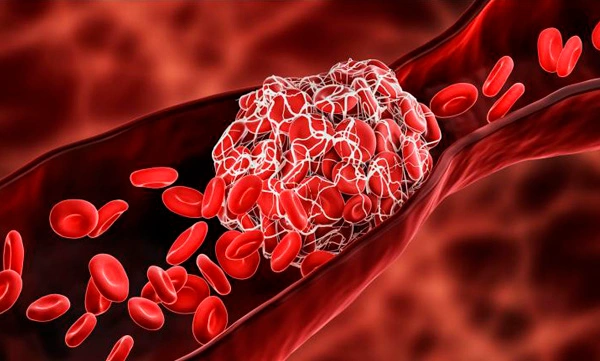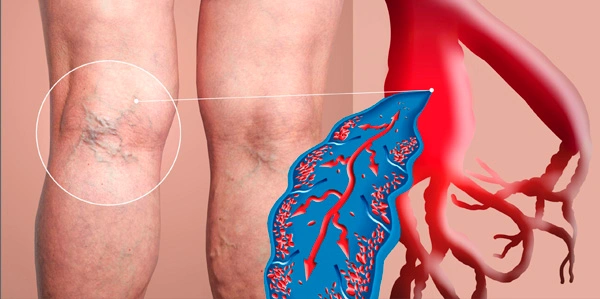Factor 5 blood clotting disorder

If you tested your DNA with a personal genomics service like 23andMe, AncestryDNA, FamilyTreeDNA, MyHeritage or another testing company, you can learn more about your risk factors for hundreds of diseases. By clicking the button above ⬆️, you can upload your raw DNA data file and receive a personalized 250-page health report with research links that is the most comprehensive.
Thrombophilia, an increased tendency to form abnormal blood clots that can obstruct blood vessels, is caused by an inherited disorder of blood clotting known as Factor V Leiden thrombophilia. This disorder is characterized by a specific gene mutation called Factor V Leiden.
Individuals with factor V Leiden thrombophilia are at a heightened risk of developing deep venous thrombosis (DVT), a type of blood clot that commonly occurs in the legs but can also affect other areas such as the brain, eyes, liver, and kidneys. Additionally, this condition increases the likelihood of clots breaking away from their original location and traveling through the bloodstream, potentially leading to pulmonary emboli in the lungs. However, it is important to note that only a small percentage (around 10%) of those with the factor V Leiden mutation will experience abnormal clotting.
Factor V Leiden can affect both genders. However, women who possess the mutation may experience a higher likelihood of developing blood clots while pregnant or using estrogen hormone therapy.
Factor V Leiden thrombophilia is caused by a specific mutation in the F5 gene, which is responsible for producing coagulation factor V. This protein is essential in the coagulation system, a sequence of chemical reactions that results in the formation of blood clots following an injury.
Several proteins, including activated protein C (APC), regulate the coagulation system. APC's role is to deactivate coagulation factor V, which slows down clotting and prevents excessive clot growth. However, individuals with factor V Leiden thrombophilia cannot have their coagulation factor V inactivated by APC as it normally would. This leads to a prolonged activation of the clotting process, increasing the likelihood of abnormal blood clot formation.
Follow the link of the selected polymorphism to read a brief description of how the selected polymorphism affects Blood clotting disorders and see a list of existing studies.
SNP polymorphisms related to the topic Blood clotting disorders:
| rs2289252 | The rs2289252 F11 polymorphism is associated with the risk of venous thrombosis. |
| rs5918 | The A2 allele of the platelet-specific alloantigen system is encoded by rs5918(C), it is associated with increased risk of myocardial infarction, heart disease and resistance to the blood thinning properties of aspirin. |
| rs9923231 | Polymorphism responsible for the level of sensitivity to warfarin (vitamin K antagonist). |
| rs7294 | Polymorphism responsible for the level of sensitivity to warfarin (vitamin K antagonist). |
| rs2359612 | Polymorphism responsible for the level of sensitivity to warfarin (vitamin K antagonist). |
| rs9934438 | Polymorphism responsible for the level of sensitivity to warfarin (vitamin K antagonist). |
| rs2884737 | Polymorphism responsible for the level of sensitivity to warfarin (vitamin K antagonist). |
| rs267606981 | Partial protein-S deficiency |
| rs769900251 | Partial protein C deficiency - increased risk of blood clotting problems. |
| rs774572099 | Partial protein C deficiency - increased risk of blood clotting problems. |
| rs121918481 | Increased risk of dysprothrombinaemia. Prothrombin Chemo 1. |
| rs1799963 | G20210A mutation of the prothrombin F2 gene. 6.74-fold risk of thrombosis |
| rs17708472 | Epoxidoreductase gene variations affecting biochemical indicators of vitamin K status. |
| rs1800775 | |
| rs2731672 | |
| rs2036914 | |
| rs1801020 | |
| rs1613662 | |
| rs13146272 | |
| rs699664 | |
| rs12340895 | |
| rs121918145 | |
| rs121918476 | |
About The Author
Li DaliLi Dali, a National Foundation for Outstanding Youth Fund recipient, is a researcher at the School of Life Sciences in East China Normal University. He earned his PhD in genetics from Hunan Normal University in 2007 and conducted collaborative research at Texas A&M University during his doctoral studies. Li Dali and his team have optimized and innovated gene editing technology, leading to the establishment of a world-class system for constructing gene editing disease models.


